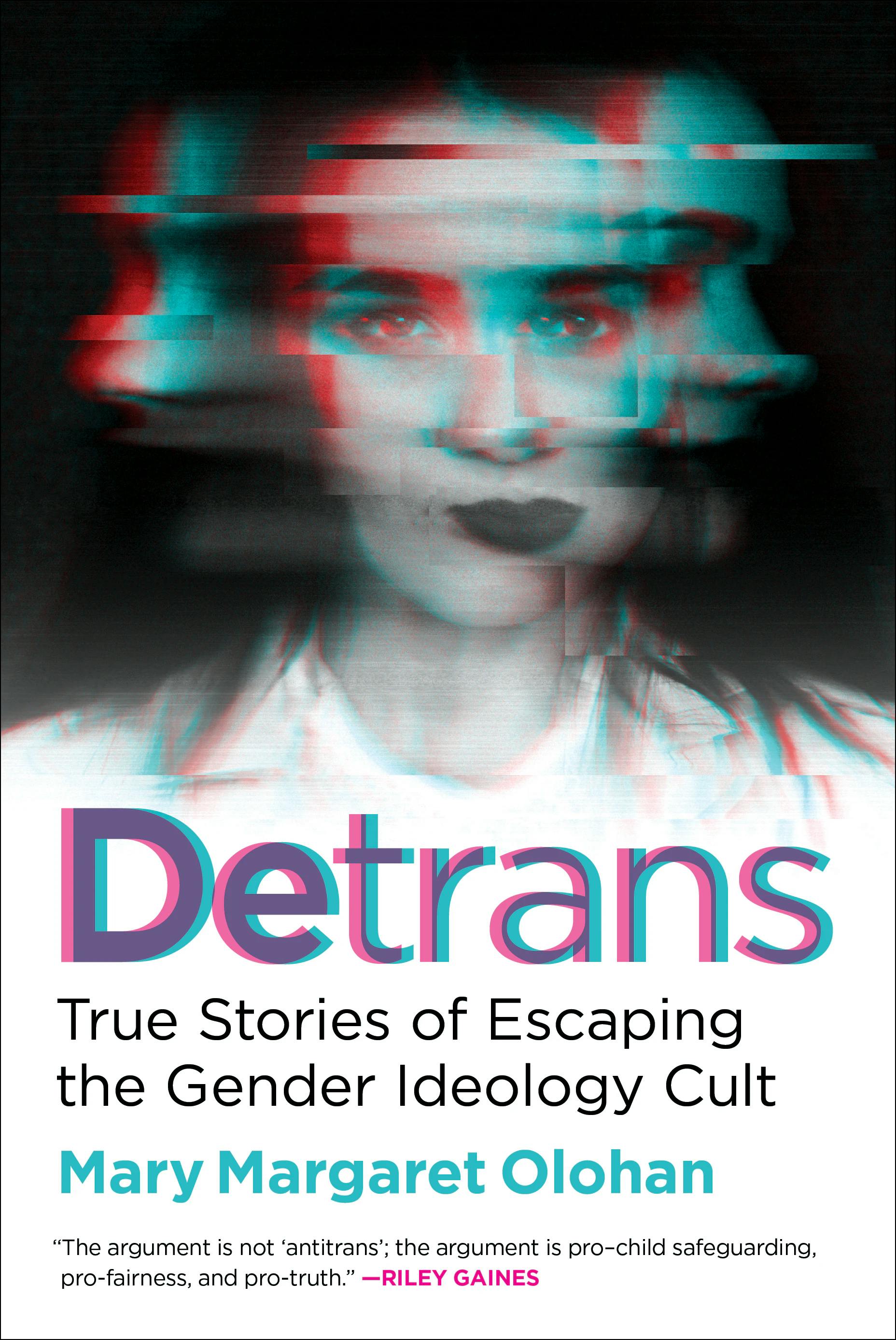Telling Former Trans Kids’ Stories: Author Mary Margaret Olohan On Her New Book “Detrans”
Detransitioners are blowing the whistle on the U.S. medical system’s push to pump minors full of hormones and puberty blockers. Mary Margaret Olohan shares their stories.

A dangerous combination of pornography exposure, toxic social media, and overreaching medical professionals has created a huge increase in the number of young people, especially young women, seeking gender transitions. Now, many of those teens and twenty-somethings wish they had never fallen for the lie that they could become the opposite sex, author Mary Margaret Olohan writes in her new book Detrans: True Stories of Escaping the Gender Ideology Cult.
“When I had the opportunity to write a book, I immediately knew that this is what I wanted to dive into because I had started seeing more and more of these detransitioners come forward,” Olohan exclusively tells Evie Magazine. “Their stories are absolutely the most powerful tool in fighting back against gender ideology, and they are turning the tide on this movement right now.”
Olohan tells the stories of male and female detransitioners in Detrans, which is available for pre-order and will be published May 28. Detrans is endorsed by some of the loudest critics of medically transitioning minors, including Ryan T. Anderson, author of When Harry Became Sally: Responding to the Transgender Movement, and Riley Gaines, NCAA all-American swimmer and advocate for women’s sports. Olohan’s book couldn’t be more timely, especially with the recent release of leaked files from the World Professional Association for Transgender Health (WPATH) that show there are far more unknowns in the world of “gender-affirming” medical care than previously revealed.
Evie Magazine caught up with Olohan, senior reporter at The Daily Signal, to discuss some of the most shocking revelations in her book.

Evie Solheim: How and when did the idea for this book originate?
Mary Margaret Olohan: I first got the idea for the book when I was covering this so-called gender-affirming care trend that was emerging where we were hearing about how important it is to affirm trans youth. I was reporting on this for the Daily Caller at the time, and it was really bothering me because I started thinking, I’m pretty sure they’re not just talking about being nice to kids who identify as transgender. I think they’re also talking about hormones and puberty blockers. Then I realized they were also talking about surgeries. As I was diving more into this topic and trying to write stories about how the establishment media was using this euphemistic phrase to describe attempted sex change surgeries, transgender hormones, and puberty blockers even for kids, I started stumbling on these online accounts of young women specifically who had tried to transition from their biological sex to become a man. I began following some of these people… One day, I stumbled upon a Twitter Spaces event that a group of detransitioners was holding. They didn’t call themselves detransitioners at the time, but they were talking about their experiences when they had tried to transition to another gender and then realized that’s impossible.
I tuned into this Twitter Spaces event and was listening to these people sharing their stories. I think I was the only reporter in there. I was just blown away. One after another, one individual would talk in a deep voice, and I would think it was a guy, and then she would reveal herself to be a woman who had been taking testosterone, which had permanently messed up her voice. Then another person would talk, and they sounded more feminine, and it would be a man who said he had been on estrogen for a long time. They were describing these wild side effects from the hormones like rage from testosterone and the inability to cry and scream for the women. The men were describing gruesome physical side effects. That specific Twitter Spaces event really captured my attention, and it bothered me, frankly. As a reporter covering cultural issues, I was like, I’m coming back to this. I need to cover this.
ES: What does gender ideology encompass? What is the goal of anybody who falls into this camp?
MMO: That’s something we don’t talk about enough. Gender ideology is something that the Left does not call gender ideology. What we call gender ideology the Left largely calls gender-affirming care or gender-affirming treatment. The Left frames a lot of this conversation in terms of loving, caring, and affirming. As I’ve learned from all of the detransitioners I’ve spoken with, they were told that if anyone in your life loves you, they’re going to affirm your gender identity. So if you tell someone in your life that you are actually a man and that you want to transition, and they tell you that you’re wrong, they hate you and they want you dead. That’s what the transgender activists tell them.

ES: And a lot of these transgender activists have access to teenagers through apps like TikTok?
MMO: It’s incredibly disturbing. Especially with young people unsupervised on the Internet, odds are they’re going to come across this content, and there are many, many transgender activists that are lurking on platforms waiting to talk to kids – to push them to question their gender, question their identity, question their family, question their whole lifestyle, and enter this trans space. It’s very evil, it’s very manipulative, and all of the girls – and the guys – that I spoke with for my book said the people they encountered online pushed them toward their transition. All of them told me that their unsupervised time on the Internet was a huge factor in their transition.
ES: What kind of backlash do the young people in your book face for being public about detransitioning?
MMO: The individuals in my book are not conservative. They’re just people who had something very traumatic happen to them and decided to come forward and share their experience publicly. Their stories are very new, very fresh. They only detransitioned a couple years ago, and when they did that they knew they were putting a target on their backs.
They’re coming forward and saying, “I tried to embrace this lifestyle. It completely failed. It is impossible for me to become a man. I was wretchedly unhappy.” Their stories are a complete and utter rejection of trans ideology, without a political bent to it. Activists hate this so much, and they will defame, they will slander, they will attack. These detransitioners get death threats. They endure a lot of backlash for speaking up. They’re incredibly brave, and they take a lot of this on the chin.
ES: What was it like interviewing these detransitioners? What was a common thread you heard in the interviews?
MMO: It was super emotional. I cried with multiple people on the phone over their experiences. I cried with some of the parents I spoke with over the phone. I like to think of myself as kind of tough, now that I’ve done a lot of reporting on culture issues, which are inherently emotional, but these stories, they just got to me. I’m thinking specifically of the last chapter in the book, which is on Abby Martinez. It’s the story of her daughter Yaeli. The rest of the book is about detransitioners who try to change their gender, and they realize it’s impossible, and they detransition and they live to tell the tale. That last chapter is the story of Abby Martinez, a mother whose daughter was taken away from her by the state of California. They transitioned her, and her daughter ultimately threw herself in front of a train.

That is a brutal, brutal story, and as part of my reporting, I got hold of the police report that describes all the pieces of Yaeli’s body that they found all over the train tracks when they went to try to identify her. That and other documents are really heartbreaking, but I thought they were important to include because they painted a really vivid picture of the absolute travesty of the end of this girl’s life and what her mother had to deal with in even having to go and identify her daughter.
ES: What are some of the other stories in the book that will stick with people?
MMO: One really interesting part is when I discuss how early the detransitioners were exposed to pornography and what effect that had on their psyches and their transition experiences. I talked to Chloe Cole about the relationship between pornography, social media, and transgender content. She was exposed to pornography around 10 or 11, and it was also around the same time she made her first Instagram account. Chloe said she went on Instagram and was inundated with all these pictures of really sexy, curvy, beautiful women who are going on all these exotic vacations. They’re dressed to the nines, and they’re posting basically soft-porn photos of themselves in bikinis, and they’re getting so much male validation. To a little girl who’s looking at that, she’s thinking, That’s what I’m supposed to be. That’s what being a woman is. She’s also being exposed to pornography and seeing women utterly degraded and treated in really horrible and objectifying ways, and she’s thinking, I don’t want that.
ES: People don’t understand the terrible rabbit holes of pornography these kids can go down.
MMO: One thing leads to another. Someone will go from thinking they’re watching a “harmless” pornographic video, and the next thing they know, they’re being recommended rape porn, animal porn, or other disgusting, horrible things. When a little girl looks at these images on Instagram, and then you combine that with the way women are depicted in pornography, a little girl like Chloe is looking at that thinking, I can’t be that kind of woman, and I don’t want to be that kind of woman I see depicted in pornography, so maybe I’m just not a woman. All of these other transgender activists [online] are saying, “Yeah, you’re not a woman. You’re actually a man. Look at all this.”
I also devoted a big chapter to men, and to one detransitioner’s experience in particular, whose name is Abel. There’s a story in there about how his father tried to cure him of feeling that he was a woman. That story, I’m not going to spoil it, but it’s pretty horrific. It’s a horrifying but important story to read.
ES: It’s very interesting that the United Kingdom is now taking more steps than the U.S. to protect minors from gender transition. What do you think it’s going to take for the U.S. to catch up on some of these bans? It’s crazy that hospitals and the medical system are typically so concerned with liability, and yet there are so many things that can go wrong with these surgeries and medical regimens.
MMO: When you have cases where a girl in her teens is learning about [trans ideology] online and goes to her parents and says, “I’m a boy now” – the parents don’t know what to do. They’re confused. They go to medical professionals and ask for help, and instead of being told realities or science, they’re told, “Would you rather have a dead daughter or a living son?” That’s a phrase that I heard over and over while writing this book. Frankly, it’s a death threat from these doctors if these parents don’t comply, and it’s terrifying.
The lawsuits are a huge step in the right direction. I want to give a shoutout to Campbell Miller Payne and Harmeet Dhillon’s law firm. These two law firms have been representing multiple detransitioners in the U.S., and just the fact that these individuals have filed lawsuits is huge. The lawsuits name the medical providers who did this to them, they name doctors and therapists. That is a huge, huge step in the right direction in holding the medical industry accountable and letting these doctors know they are not God and they have committed crimes against children. These doctors have been operating under this privileged aura of respect, and they don’t deserve that. They deserve to be shamed, and that’s what these lawsuits are doing.

ES: How serious is it that many minors who identify as trans are effectively being sterilized by doctors? How are they able to make these choices when they are years from meeting their future husbands or wives?
MMO: A lot of these girls haven’t even held hands with someone before. When a young girl is put on puberty blockers, the idea is that those blockers will stop her from progressing in puberty while she supposedly figures out her gender dysphoria. What they don’t tell that little girl is that this might make it so that she can’t have children. The nature of these things is so experimental that they don’t really know the effects of these types of drugs on young people or in general. The release of the WPATH files recently shows that. These so-called experts are discussing how some of the hormones are giving girls tumors and how the girls are sterilized. It’s very clear from the communications that these experts are puzzled and trying to figure things out, but that’s not what they’re saying when they issue their confident guidance that all the major medical organizations in the U.S. embrace.
ES: Do you think there’s going to be a return of sanity on this issue in the mainstream media?
MMO: I do notice that establishment media has very slowly but surely begun to report on the stories of detransitioners. The Washington Post and The New York Times have both done what I would call ground-breaking work on this recently – not necessarily breaking ground, but it’s ground-breaking for The Washington Post and The New York Times. Of course, they’ll always add in the caveats that very few people regret their transitions, and they try to include all the talking points from the LGBTQ+ organizations so they don’t get themselves in trouble, but it’s definitely a step in the right direction.
It’s going to take more independent-thinking writers and journalists who aren’t afraid to have a detransitioner on their nighttime show. It doesn’t need to become a partisan thing. Just ask them basic questions. We need more people doing that.
ES: Do you think this problem is going to get worse before it gets better? Do you think we’ve hit the peak of young people transitioning?
MMO: My hope is that we have hit the peak. My hope is that there is enough people speaking out now that this is going to become not the loving, affirming movement that LGBT activists have framed it as for the past five to ten years, but that there is going to be stigma attached to it, and these doctors and therapists are going to at the very least proceed with more caution. An important factor is the whistleblowers coming forward from gender clinics and revealing that these clinics are pushing these kids through transition without any safeguards. My hope is that we’re on the way down, but we can only continue to shine light on the truth and pray.
This interview has been edited for length and clarity.
Olohan's book, Detrans, is available for pre-order now and will be published May 28. Get your copy here!
Evie deserves to be heard. Support our cause and help women reclaim their femininity by subscribing today.